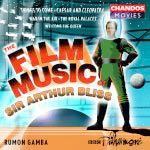
The Film Music of (Incls Things to Come & Caesar and Cleopatra)
 $40.00
Out of Stock
$40.00
Out of Stock6+ weeks add to cart
ARTHUR BLISS
The Film Music of (Incls Things to Come & Caesar and Cleopatra)
BBC Philharmonic / Rumon Gamba
[ Chandos Movies / CD ]
Release Date: Monday 23 July 2001
This item is currently out of stock. It may take 6 or more weeks to obtain from when you place your order as this is a specialist product.
Rosette (Highest Award) Penguin Stereo Guide
"This splendid CD confirms Bliss as a composer of resource, who could write good tunes to order - at least in the early part of his career...state-of-the-art Chandos recording" (Penguin Guide)
"Enjoyable, well-played survey of Bliss's pungent, beautifully orchestrated film scores."
Gramophone Magazine (July 2001)
'Overall, Gamba and the BBC Philharmonic are fine advocates for this music. The sound quality is spectacular, and , as I mentioned above the annotations are excellent.'
- Fanfare
For over sixty years Things to Come has exercised and enduringly baleful fascination, yet for all its spectacular effects, star names, massive budget, and the involvement of an internationally renowned author and the nation's most celebrated filmmaker, it is for its music that the film will be forever remembered. Still the greatest of all film scores, according to some, the music for Things to Come set a standard which fuelled the expectations of thinking cinema-goers and initiated the golden age of British music which, while not yet utterly dead , survives mostly in memory. The film itself had a mixed reception, but the music was a sensation and its independent future life was assured. History tells that a suite (1935) was a brilliant success at the BBC Promenade Concerts even before the release of the film, that a collection of three discs which sold like hotcakes was issued, and that the music has been a standard of the orchestral repertoire ever since.
In its own way, the tale of Caesar and Cleopatra is equally strange, and there are distinct parallels to that of Things to Come. This film, too, involved a world-renowned author, George Bernard Shaw, a star producer from overseas, Gabriel Pascal, and was a follow-up to a box-office hit. Pascal had his own ideas about music: initially he wanted Prokofiev to write it but when this got nowhere he approached William Walton who also turned the job down. Bliss was Shaw's choice, and the director's undisguised resentment got things off on the wrong foot. The memory was still green in Bliss's mind when a dozen years later, apropos of his exploits in film music, he wrote of '…unforgettable experiences with one director who, where music was concerned, was a certifiable lunatic'.
The Welcome the Queen March was the fruit of his work as a Master of the Queen's Musick, a position he took very seriously. He wrote the march for the Pathé newsreel of the return of the young Queen Elizabeth from a Commonwealth tour in 1954. The Suite The Royal Palaces is music composed in 1966 for the BBC/ITV television documentary The Royal palaces of Britain. The programme was broadcast on Christmas Day and narrated by Sir Kenneth Clark.
* * * * * * * * * * * * * * * * *
Based in Manchester, the BBC Philharmonic has established an international reputation, having travelled extensively to the USA, the Far East, South America and all over Europe. Its Principal Conductor is Yan Pascal Tortelier, Sir Edward Downes is Conductor Emeritus and Vassily Sinaisky (Music Director of the Moscow Philharmonic) is Principal Guest Conductor.
The Orchestra records over one hundred programmes annually for BBC Radio 3 and BBC Television both in the studio and in public concerts all over Britain. Under its exclusive Chandos contract the BBC Philharmonic displays an extensive repertoire featuring artists such as Gennady Rozhdestvensky, Matthias Bamert and Richard Hickox as well as its own conductors.
Tracks:
Welcome the Queen
Things to Come: Concert Music from the Film
The Royal Palaces Suite
Caesar and Cleopatra
Theme from 'War in the Air'


